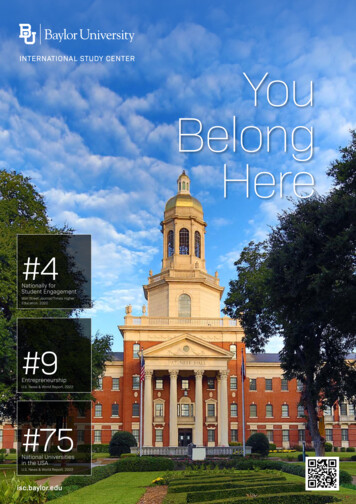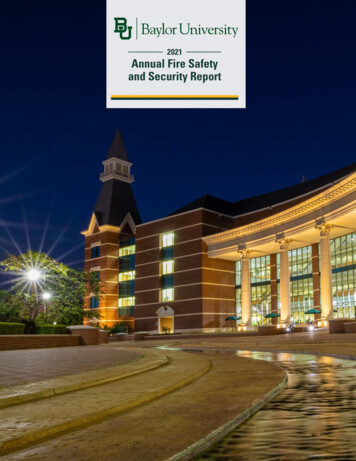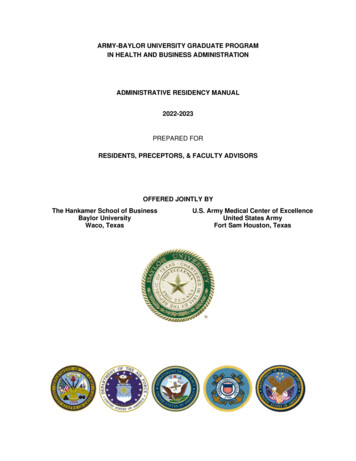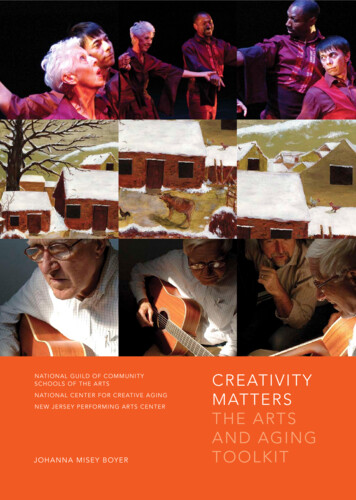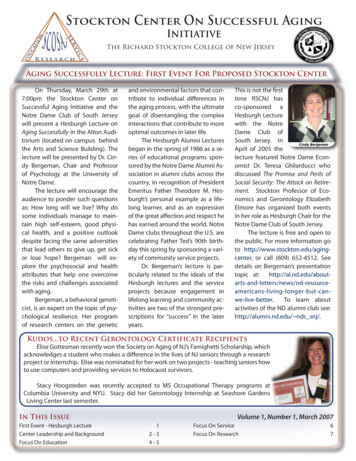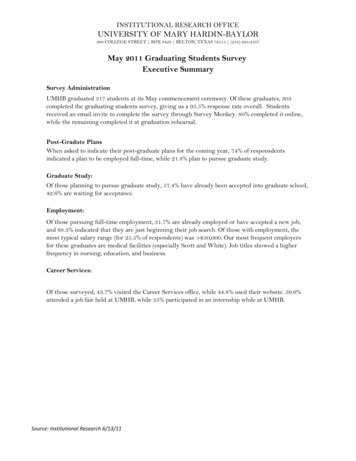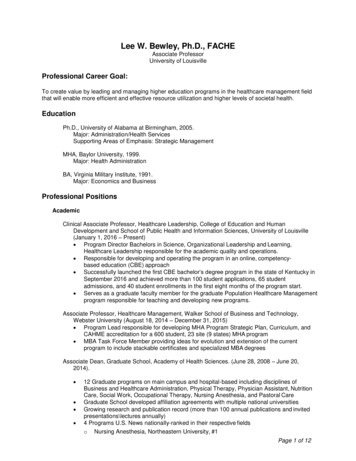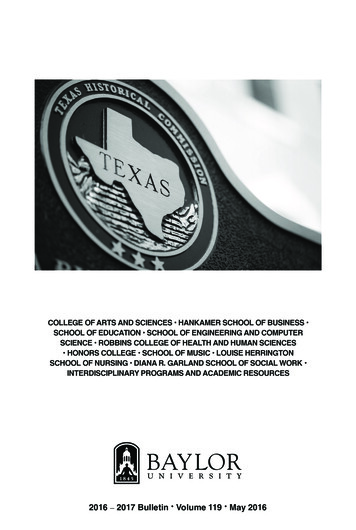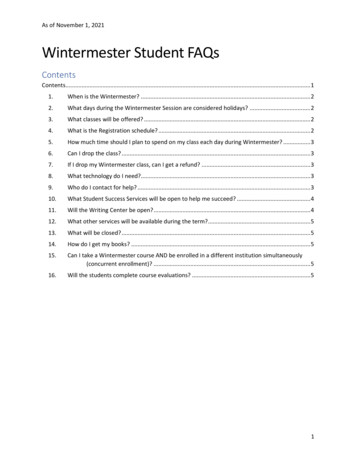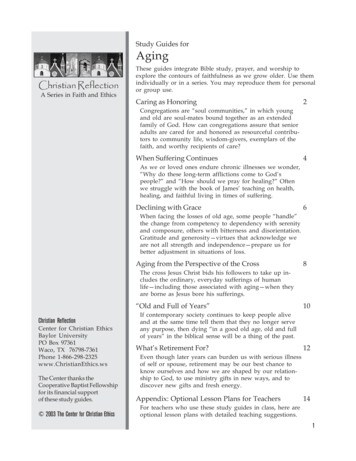
Transcription
Study Guides forAgingChristian ReflectionA Series in Faith and EthicsThese guides integrate Bible study, prayer, and worship toexplore the contours of faithfulness as we grow older. Use themindividually or in a series. You may reproduce them for personalor group use.Caring as Honoring2Congregations are “soul communities,” in which youngand old are soul-mates bound together as an extendedfamily of God. How can congregations assure that senioradults are cared for and honored as resourceful contributors to community life, wisdom-givers, exemplars of thefaith, and worthy recipients of care?When Suffering Continues4As we or loved ones endure chronic illnesses we wonder,“Why do these long-term afflictions come to God’speople?” and “How should we pray for healing?” Oftenwe struggle with the book of James’ teaching on health,healing, and faithful living in times of suffering.Declining with Grace6When facing the losses of old age, some people “handle”the change from competency to dependency with serenityand composure, others with bitterness and disorientation.Gratitude and generosity—virtues that acknowledge weare not all strength and independence—prepare us forbetter adjustment in situations of loss.Aging from the Perspective of the Cross8The cross Jesus Christ bids his followers to take up includes the ordinary, everyday sufferings of humanlife—including those associated with aging—when theyare borne as Jesus bore his sufferings.“Old and Full of Years”Christian ReflectionCenter for Christian EthicsBaylor UniversityPO Box 97361Waco, TX 76798-7361Phone 1-866-298-2325www.ChristianEthics.wsThe Center thanks theCooperative Baptist Fellowshipfor its financial supportof these study guides. 2003 The Center for Christian Ethics10If contemporary society continues to keep people aliveand at the same time tell them that they no longer serveany purpose, then dying “in a good old age, old and fullof years” in the biblical sense will be a thing of the past.What’s Retirement For?12Even though later years can burden us with serious illnessof self or spouse, retirement may be our best chance toknow ourselves and how we are shaped by our relationship to God, to use ministry gifts in new ways, and todiscover new gifts and fresh energy.Appendix: Optional Lesson Plans for Teachers14For teachers who use these study guides in class, here areoptional lesson plans with detailed teaching suggestions.1
Caring as HonoringChristian ReflectionA Series in Faith and EthicsFocus Article:Caring as Honoring(Aging, pp. 9-17)Suggested Article:Come, Let Us Worship(Aging, pp. 79-82)Congregations are “soul communities” where young and old aresoul-mates bound together as an extended family of God. Howcan congregations assure that senior adults are cared for andhonored as resourceful contributors to community life, wisdomgivers, exemplars of the faith, and worthy recipients of care?PrayerScripture Readings: Matthew 15:1-9 and Ephesians 6:1-4Responsive Reading†Praise the LORD!Praise the LORD, you highest heavens,and you waters above the heavens!Let them praise the name of the LORD,for he commanded and they were created.Praise the LORD from the earth,you sea monsters and all deeps!Mountains and all hills,fruit trees and all cedars!Wild animals and all cattle,creeping things and flying birds!Kings of the earth and all peoples,princes and all rulers of the earth!Young men and women alike,old and young together!Let them praise the name of the LORD,for his name alone is exalted;his glory is above earth and heaven.Praise the LORD!ReflectionCenter for Christian EthicsBaylor UniversityPO Box 97361Waco, TX 76798-7361Phone 1-866-298-2325www.ChristianEthics.wsThe commandment to honor our parents (Exodus 20:12 andDeuteronomy 5:16) goes beyond obeying and respecting themwhen we are children (Ephesians 6:1). Jesus consistently appliedit to adults caring for their elders (Matthew 15:1-9; compare hisstatement to the rich young man in 19:19). Scripture instructs thechurch to extend respect and care to widows and to all elders(Acts 6:1-6; 1 Timothy 5:1-8). Of course, we care for the oldestamong us not only from our commitment to upholding thesebiblical injunctions to honor them, but also because we werecreated for community with one another and with God. “Indeed, the grounds for honor-bestowing caring are found in therichness of the metaphor ‘image of God,’” writes Anne StreatyWimberly. “When we see clearly this image in our elders, welikewise understand caring as honoring to be a journey of God’speople, the young and old together. The journey of the youngwith the elders is in preparation for their own continuing journey. It is the whole community’s learning from and respondingto senior adults as persons of worth.” How can we make honorbestowing care for our elders concrete in our lives? 2003 The Center for Christian Ethics Remembering how the lives of specific older adults intertwinewith our lives, even when we struggle with these memories,What do you think?Was this study guide usefulfor your personal or groupstudy? Please send yoursuggestions to:Christian Reflection@baylor.eduChristian Reflection2
Christian ReflectionA Series in Faith and Ethicscan lead us to honor them and other senior adults. As a student concluded to Wimberly, “We must care for and honorthem because of the life God gave them and has given usthrough them, the wisdom shared by them, the needs theyhave for care, and the opportunity we still have to learn fromtheir lives.” This remembering occurs only when we resist theyouth orientation that separates the generations. Congregations fulfill their calling to be soul communities whenthey love and sustain their members as an extended family ofGod. They validate their older members as resourceful contributors in its ongoing life, as exemplars of the faith, and asrepositories of wisdom. After senior adults can no longeractively participate in their gatherings, congregations validatetheir role as worthy recipients of care. Being present with older adults in conversation and listeningis easily neglected in “our fast-paced, technological, productivity- and material-driven world.” We need to emphasizerelational time, intentionally structured for “listening to andsharing the stories of life’s journey, engaging in moral discourse where it is called for, and participating with them andfamily members in discerning answers to difficult life anddeath questions,” Wimberly writes. “A relational orientationto time also understands that churches must become networkbuilders, connecting senior adults with resources churchescannot provide, but are available in the wider community.”Study Questions1. How can you provide more “relational time” with olderadults in your family and in your congregation? How can youcultivate more opportunities for remembering their contributions to your life?2. Wimberly urges us to provide honor-bestowing care for thewell-being of senior adults in seven aspects: spiritual, social,mental, physical, work and economic, recreational, and environmental (Aging, pp. 14-15). How does your congregationhonor its older members in each of these ways?3. John Westerhoff describes older adult, adult, and youngerpeople as the generations of memory, the present, and vision(Aging, p. 81). How are these generations linked or separated inworship, study, and service in your congregation?Robert B. Kruschwitz, the author ofthis study guide, directs TheCenter for Christian Ethicsat Baylor University. Heserves as General Editor ofChristian Reflection.4. “‘Honor your father and mother’ is a social injunction designed for mature children and their even more mature parents,” David Buttrick notes. “Moreover, the commandmentaddresses corporate Israel. We Americans tend to read ourBibles as if every ‘you’ were second-person singular. But theFifth Commandment is addressed to Israel and is intended todefine social policy. In other words, the commandment hasmore to do with social security issues than with psychologicalattitudes within the family” (quoted in Aging, p. 72). What arethe implications of this observation for our society?Departing Hymn: “Then Dawns the Light” 2003 The Center for Christian Ethics†Adapted from Psalm 148 (NRSV).3
When Suffering ContinuesChristian ReflectionA Series in Faith and EthicsFocus Article:When SufferingContinues(Aging, pp. 26-35)When we endure chronic illnesses we wonder, “Why do longterm afflictions come to God’s people?” “How should we prayfor healing?” Often we struggle with the book of James’ teachingon health, healing, and faithful living in times of suffering.PrayerScripture Reading: James 5:13-18Responsive Reading†When the storms of life are raging, stand by me, stand by me.When the storms of life are raging, stand by me, stand by me.When the world is tossing me, like a ship upon the sea,Thou who rulest wind and water, stand by me, stand by me.In the midst of faults and failures, stand by me, stand by me.In the midst of faults and failures, stand by me, stand by me.When I’ve done the best I can, and my friends misunderstand,Thou who knowest all about me, stand by me, stand by me.When I’m growing old and feeble, stand by me, stand by me.When I’m growing old and feeble, stand by me, stand by me.When my life becomes a burden, and I’m nearing chillyJordan,O thou Lily of the Valley, stand by me, stand by me.ReflectionWhat do you think?Was this study guide usefulfor your personal or groupstudy? Please send yoursuggestions to:Christian Reflection@baylor.eduChristian ReflectionCenter for Christian EthicsBaylor UniversityPO Box 97361Waco, TX 76798-7361Phone 1-866-298-2325www.ChristianEthics.ws 2003 The Center for Christian EthicsRobert Rakestraw, who has endured heart disease for fifteenyears, knows about chronic suffering: “It persists day after dayand year after year, and this duration itself becomes a major partof the suffering.” This is true for physical pain and for symptomsthat involve other sorts of suffering, such as ringing in the ears,impairment of sight, loss of appetite, fatigue, breathing difficulties, mental disorders, emotional weaknesses, loss of memoryand identity, or the effects of strokes and heart attacks.God does not abandon us, but offers help for our physicalneeds. We see remarkable healings sometimes. Yet at other timeswe are not healed and we pray for others who are not healed.So, how should we understand the promise that “the prayer offaith will save the sick, and the Lord will raise them up” (5:15)? The proper faith view says health is restored if those who pray“have the right kind of faith.” This creates much guilt forpetitioners when they are not granted the healing they desire.“The prayer of faith,” Rakestraw concludes, cannot be “soelusive and difficult to attain that even the most spiritualChristians today fail often to obtain it when seeking God’shealing power. We need to be deeply grateful that God doesanswer our prayers for healing quite often, but we also needto recognize that, at times, the same people pray for healing insimilar circumstances, yet see no healing.” According to the sovereign gift view, “when God sovereignlychooses to heal, he gives the faith necessary for those praying.” This fits with Paul’s teaching that the spiritual gifts offaith and healing are given “to each one individually just as4
Christian ReflectionA Series in Faith and Ethicsthe Spirit chooses” (1 Corinthians 12:9, 11). Though this viewrightly “honors God as the healer,” Rakestraw notes, “it stillleaves us with the question of why the invitation of James 5 ispresented in such a wide-open manner, urging the seriously illperson to call the elders for healing and expressing such confidence that the healing will come.” The will of God view suggests the promise of healing, like allother promises in the Bible, depends upon the will of God ineach situation. “We are to ask for healing, knowing that Godis able to do what we ask. However, we are to leave the outcome with our wise and gracious God, who may or may notchoose to heal in this or that specific instance.”Rakestraw admits that he wavers between the sovereign giftand will of God views, though he favors the latter. Both viewsemphasize God’s freedom in healing. On the will of God view,however, it is appropriate to add “if it is your will” to prayersfor healing: we approach God with confidence, but withoutclaiming to know precisely what God’s will is in every situation.Study Questions1. Do you think the proper faith, the sovereign gift, or the will ofGod view is the best interpretation of the “prayer of faith”promise? What further questions do you have?2. What do we learn from the larger context in James 5:13-18about how God wants us to pray for the suffering? What isthe role of the community of faithful disciples in this passage?3. Does James 5 leave room for the application of our medicalknowledge, or should faithful prayer replace those efforts?4. Many Bible texts reveal that God is in favor of good physicalhealth (see, for example, Exodus 23:25-26 and Psalm 103:2-5).What can we learn from Jesus’ healing ministry described inMatthew 8:1-10:1 (and crystallized in 8:17)?5. How does Paul illuminate the deep causes of suffering in theworld in Romans 8:21-22?Departing Hymn: “Abide With Me” (verses 1, 2, and 7)Robert B. Kruschwitz, the author ofthis study guide, directs TheCenter for Christian Ethicsat Baylor University. Heserves as General Editor ofChristian Reflection. 2003 The Center for Christian EthicsAbide with me, fast falls the eventide;the darkness deepens: Lord with me abide!When other helpers fail, and comforts flee,help of the helpless, O abide with me.Swift to its close ebbs out life’s little day;earth’s joys grow dim, its glories pass away;change and decay in all around I see:O Thou who changest not, abide with me.I fear no foe, with Thee at hand to bless;ills have no weight, and tears no bitterness.Where is death’s sting? Where, grave, thy victory?I triumph still, if Thou abide with me.Henry F. Lyte (1847)Suggested Tunes: EVENTIDE or MORECAMBE†From “When the Storms of Life are Raging,” Charles Albert Tindley (1905).5
Declining with GraceChristian ReflectionA Series in Faith and EthicsWhen facing the losses of old age, some people “handle” thechange from competency to dependency with serenity andcomposure, others with bitterness and disorientation. Gratitude and generosity—virtues that acknowledge we are not allstrength and independence—prepare us for better adjustmentin situations of loss.PrayerScripture Reading: Colossians 3:12-17Responsive Reading†Focus Article:Declining with Grace(Aging, pp. 36-42)Every generous act of giving, with every perfect gift, is fromabove, coming down from the Father of lights, with whomthere is no variation or shadow due to change.In fulfillment of his own purpose he gave us birth by theword of truth, so that we would become a kind of firstfruits of his creatures.But be doers of the word, and not merely hearers who deceive themselves. For if any are hearers of the word andnot doers, they are like those who look at themselves in amirror; for they look at themselves and, on going away,immediately forget what they were like.But those who look into the perfect law, the law of liberty,and persevere, being not hearers who forget but doerswho act—they will be blessed in their doing.ReflectionWhat do you think?Was this study guide usefulfor your personal or groupstudy? Please send yoursuggestions to:Christian Reflection@baylor.eduChristian ReflectionCenter for Christian EthicsBaylor UniversityPO Box 97361Waco, TX 76798-7361Phone 1-866-298-2325www.ChristianEthics.ws 2003 The Center for Christian EthicsThe Apostle Paul reminded the Colossians that in their baptism,they “have died” and “been raised with Christ.” He appealed totheir memories of disrobing and donning baptismal clothes: “youhave stripped off the old self with its practices and have clothedyourselves with the new self, which is being renewed in knowledge according to the image of its creator” (Colossians 3:9b-10).Their new self, celebrating its interdependence within the “onebody” of Christ, should generously brim with love, humility, andpatience, and literally sing with gratitude!In her hospice care practice, Elizabeth Roberts has noticed that“older persons who have ingrained in themselves, by long practice, the patterns of gratitude and generosity, handle disabilitybetter than the resentful and the grasping.” They display spiritual maturity in facing their dependency and weakness, havebetter relationships with caregivers, and can enjoy the goodthings in other’s lives. Developing gratitude and generosity, sheand Bob conclude, “is a kind of long-term care insurance that wecan practice every day of our lives, as is natural for those whoare daily growing up in every way into him who is the head, ourgenerous Lord Jesus Christ.” Gratitude is more than “positive thinking,” or looking on thebright side of events; it is gladness to be in relation with andreceiving good things from someone. The Roberts distinguishthe grateful person from a “deserver” who needs to feelentitled to the good things he receives. “The truly grateful6
Christian ReflectionA Series in Faith and Ethicsperson, by contrast, has a sense of not deserving the good shereceives, and above all she does not insist on deserving allthat she has.” The grateful person differs from both an “exchanger” who feels demeaned by any gift he cannot “payback,” and from a “grubber” who welcomes gifts but doesn’tpay much attention to the givers. Christians are in an idealposition to become grateful persons, because “every good wehave, both material and spiritual, is from the hand of a personal God who has given us these things without our deserving them,” the Roberts write. “We are in no position to payGod back, and in no position simply to be heedlessly grubbing up all the goods we can.” Generosity is a disposition to give graciously, just as gratitude isa disposition to receive graciously. The generous person givesfreely from the heart, without a sense of the pressure of obligation, and with a loving attitude toward the recipient. “Thegrateful Christian will be generous” because she believes “thateverything ultimately belongs to God, who showers us withhis grace; if we are to be like him, we must become littleshowers in our own right,” the Roberts write. “The practiceof giving away, of sitting loose to one’s possessions and time,and of seeing regularly beyond oneself to the needs andinterests of others, is a kind of practicing-up for the inevitablelosses that await us. It is a practice of detachment from ourselves that prepares us to move on, freely and gladly, towhatever God has in store for us.”Study Questions1. Who, among the older people you know, are responding withgrace to the dependency that attends old age? Do you seesigns of gratitude and generosity in their lives?2. Do you know older people who have been overwhelmed bythe losses and suffering they must endure? How can yourcongregation serve them?Robert B. Kruschwitz, the author ofthis study guide, directs TheCenter for Christian Ethicsat Baylor University. Heserves as General Editor ofChristian Reflection. 2003 The Center for Christian Ethics3. Comment on J. R. P. Schlater’s observation: “Old age hasmany compensations, but it is always a discipline. The process by which God pries our fingers loose from their clutch onthings material is not entertaining. The closing of the senses,the increasing feebleness of the physical powers, and the pathetic loneliness of great age make up a process of detachmentwhich is stern in its mercy (cf. the frank depression of Ecclesiastes 11:7-8).” (Quoted by Stephen Sapp in Aging, p. 21.)4. How can we prepare, during younger and middle-age years,to be more grateful for God’s gifts and more generous withour resources in our later years?5. Folliot S. Pierpoint’s beloved hymn, “For the Beauty of theEarth,” celebrates the gifts from a generous Creator. For whatis the hymn writer thankful? How is this hymn a model forour gratitude?Departing Hymn: “For the Beauty of the Earth”† James 1:17-18, 22-25 (NRSV).7
Aging from the Perspective ofthe CrossChristian ReflectionA Series in Faith and EthicsFocus Article:Aging from the Perspective of the Cross(Aging, pp. 18-25)The cross Jesus Christ bids us to take up includes the ordinary,everyday sufferings of human life—including those associatedwith aging—when they are borne as Jesus bore his sufferings.PrayerScripture Readings: Luke 9:21-25; 2 Corinthians 1:3-7 and 4:7-10Responsive Reading†Must Jesus bear the cross alone,And all the world go free?No, there’s a cross for everyone,And there’s a cross for me.The consecrated cross I’ll bearTill death shall set me free;And then go home my crown to wear,For there’s a crown for me.Must Jesus bear the cross alone,And all the world go free?ReflectionWhen we describe aging exclusively from the perspective of ourhope in Christ’s resurrection, we may give an unduly optimisticaccount of old age. Of course, with Paul, we rightly proclaim thatabout the suffering that attends old age and death, we need “notgrieve as others do who have no hope” (1 Thessalonians 4:13).Yet, we can offer a balanced view of aging and take seriously thereal losses that we suffer as we grow older, Stephen Sapp urges,if we also look at old age from the perspective of the cross.Taking up our daily cross in the normal afflictions of growingolder would include:What do you think?Was this study guide usefulfor your personal or groupstudy? Please send yoursuggestions to:Christian Reflection@baylor.eduChristian ReflectionCenter for Christian EthicsBaylor UniversityPO Box 97361Waco, TX 76798-7361Phone 1-866-298-2325www.ChristianEthics.ws 2003 The Center for Christian Ethics Acknowledging our dependence. Fearing dependency, we tend topreserve youthfulness by any means possible and to institutionalize those who need care. However, “Christianity is allabout being dependent, accepting that we do not live on ourown and only for ourselves at any point in life, not just whenwe grow old,” Sapp observes. “If we can assimilate the factthat we are totally dependent throughout life upon the creating, redeeming, and sustaining God, then perhaps it will beeasier to accept increasing dependence upon other humanbeings as we grow older.” Recognizing the true basis of personal value. Consumerism pressures us to value people by what they have (physical attractiveness, vitality, and ability to produce) and can consume (interms of the capacity to use and income to afford). No wonder that retirement threatens to empty our lives of meaning!By contrast, “the biblical teachings of the creation of all human beings in the image of God and of Christ’s death for thesake of all [affirms] that our value does not rest in what wedo or have, but in what we are in God’s sight.” Furthermore,God may call us in old age to some great (or small) task.8
Christian ReflectionA Series in Faith and Ethics Accepting mutual responsibility. “The suffering of each forChrist’s sake,” Sapp writes, “entails the sacrifice of each amidthe limitations and suffering that are common to all humanbeings.” Or, as the Apostle Paul puts it, our afflictions shouldprepare us to offer consolation to one another. Elderly people,who feel pushed to the fringes of society, may be tempted towithdraw from younger people, adopt an “us against them”attitude, and dodge their responsibilities to their church andto caring for others. Yet the church, “functioning as theearthly body of its Risen Lord, who has called all his followers to take up their own crosses as he once did,” Sapp notes,“surely rejects making excuses for not participating in its workand activities, whatever one’s age.”Study Questions1. Have you been inspired by how an older person deals withsuffering? Did this person carry “in the body the death ofJesus, so that the life of Jesus may also be made visible” (2Corinthians 4:10)?2. Do you agree that we fear dependence upon others? If so,what are some examples of this fear?3. Discuss President Jimmy Carter’s statement: “We are notalone in our worry about both the physical aspects of agingand the prejudice that exists toward the elderly, which issimilar to racism or sexism. What makes it different is that theprejudice also exists among those of us who are either withinthis group or rapidly approaching it” (quoted in Aging, p. 70).4. “Whatever our culture tells us about life being an inevitablydemoralizing business of falling apart, it is not what humanlife is about,” Roberta Bondi writes. “Bodies do wear out andour minds do get slower, but human beings are made in theimage of God who is love; and God’s intention for us, if wechoose to pursue it, is continual growth—growth in love bothof God and neighbor” (quoted in Aging, p. 71). How does thissupport Sapp’s “perspective from the cross”?Departing Hymn: “Abide With Me” (verses 1, 2, and 8)Robert B. Kruschwitz, the author ofthis study guide, directs TheCenter for Christian Ethicsat Baylor University. Heserves as General Editor ofChristian Reflection. 2003 The Center for Christian EthicsAbide with me, fast falls the eventide;the darkness deepens: Lord with me abide!When other helpers fail, and comforts flee,help of the helpless, O abide with me.Swift to its close ebbs out life’s little day;earth’s joys grow dim, its glories pass away;change and decay in all around I see:O Thou who changest not, abide with me.Hold Thou Thy cross before my closing eyes;shine through the gloom and point me to the skies:heaven’s morning breaks, and earth’s vain shadows flee;in life, in death, O Lord, abide with me.Henry F. Lyte (1847)Suggested Tunes: EVENTIDE or MORECAMBE†From verses 1 and 3 of “Must Jesus Bear the Cross Alone?” Verse one byThomas Shepherd, Penitential Cries, 1693 altered; verse three from TheOberlin Social and Sabbath School Hymn Book, by George N. Allen, 1844.9
“Old and Full of Years”Christian ReflectionA Series in Faith and EthicsFocus Article:Aging with Hope andWonder(Aging, pp. 65-69)Suggested Articles:Aging from the Perspective of the Cross(Aging, pp. 18-25)The Gift of Years inChristian Art(Aging, pp. 48-54)What do you think?Was this study guide usefulfor your personal or groupstudy? Please send yoursuggestions to:Christian Reflection@baylor.eduChristian ReflectionCenter for Christian EthicsBaylor UniversityPO Box 97361Waco, TX 76798-7361Phone 1-866-298-2325www.ChristianEthics.ws 2003 The Center for Christian EthicsIf contemporary society continues to keep people alive and at thesame time tell them that they no longer serve any purpose, thendying “in a good old age, old and full of years” in the biblicalsense will be a thing of the past.PrayerScripture Readings: Genesis 18:1-15 and 25:7b-11Reading†Grow old along with me!The best is yet to be,The last of life, for which the first was made:Our times are in His HandWho saith “A whole I planned,Youth shows but half; trust God, see all, nor be afraid!”Reflection“Though today, television, radio, and print media champion theyoung as models of vision, vigor, and imagination, as if thesewere the only people worthy of notice, the Bible portrays quiteanother story,” notes Terry Thomas Primer. “Many key characters, chosen by God to move forward the divine-human story,were senior citizens, many years past their prime, even accordingto our standards.”Abraham and Sarah were already “old, advanced in age”—one hundred years old and ninety years old, respectively—whenGod visited them in the form of three mysterious men. Abraham’s hospitality was spontaneous and lavish: he and Sarahprepared a great meal and Abraham waited upon the guests astheir servant. Then the focus shifts to Sarah, who has been outof view in the tent. “Then one said, ‘I will surely return to youin due season, and your wife Sarah shall have a son’ (Genesis18:10). It was a calling, a vocation, but such a strange one! Sarahstifled a laugh.Primer, who is a nursing home chaplain, has shared this storywith the residents she serves. “Would you like to be pregnant?”she asked them. “You should have heard the giggles. The womenall looked at themselves and then at one another. In their facesyou could see memories of pregnancy, childbirth, and two-yearolds running wild. Then, as they looked at themselves in wheelchairs and with walkers, they laughed deep throaty chuckles ofrelief. Not a single one of them volunteered to become a motheragain.”God’s invitation required Abraham and Sarah to respondwith faith. Their baby’s name, Isaac, means “laughter,” recallingSarah’s giggles in this story and Abraham’s deep belly laughterearlier when God promised them a son (Genesis 17:17). “In mymind’s eye I can see them, old beyond their years, gettingundressed for the night as the stars begin to twinkle,” Primermuses. “Slipping into bed, they kiss, holding each other tightly—and I bet they laughed, hoping against hope that the heavenlyvisitors are right, that there is nothing too difficult for God.”10
Christian ReflectionA Series in Faith and EthicsThis remarkable story reminds us that God appears in unexpected places and comes to us at any age. A fitting conclusion isfound in the report that seventy-five years later “Abrahambreathed his last and died in a good old age, an old man and fullof years” (Genesis 25:8).In this scripture old age is a highly desirable goal. StephenSapp suggests that a person “full of years” is like a container fullof liquid: “it can hold no more and has fulfilled its purpose bycontaining all that it was designed to hold. Similarly, to die ‘fullof years’ is to be satisfied, completed, indeed, ‘full-filled’ in amost literal sense, having lived all the years one was intended tolive.” The biblical goal is not merely a longer life, but a life filledwith purpose—with God’s call and our faithful response.Study Questions1. Do you know older people who, like Abraham and Sarah,make rich contributions to the l
Christian Reflection A Series in Faith and Ethics Christian Reflection Center for Christian Ethics Baylor University PO Box 97361 Waco, TX 76798-7361 Phone 1-866-298-2325 www.ChristianEthics.ws The Center thanks the Cooperative Baptist Fellowship for its financial support of these study guides.
